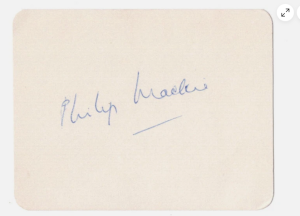
It is close to 100 years since one of Salford’s most important creative forces was born, and nearly 40 years since his untimely death.
Philip Mackie, grandfather of Doctor Who actor Pearl Mackie, adapted The Naked Civil Servant in 1975, described as a landmark in British television history and worked alongside TV legend Nigel Kneale.
The book, an autobiographical account of British gay icon Quentin Crisp, was adapted for TV by Mackie and was received well by audiences and critics alike. Mackie’s adaptation led to the lead actor John Hurt winning a Bafta for best actor in 1976, and, in 2000, the film came fourth in a poll by industry professionals to find the BFI TV 100 of the 20th century.
But the playwright started from humble beginnings. Philip Mackie, born 26th November 1918, was a Salford-born writer and producer, one of two screenwriters first employed at the BBC. The 23rd of December will mark 40 years since he died in 1985.
Mackie studied at University College London, where he read English. Following military service during the Second World War, Mackie landed a role at the Ministry of Information Films Division in 1946.
In this role, he produced a documentary in Europe in cities such as Rome, Paris and Amsterdam. In 1954, he published a wartime book titled ‘Hurrah the flag’ which was described by Reynolds News as ‘A delightful self-critical account of war days in Northern Italy and of the girl he met there but forgot to write to afterwards.’
That same year, he became one of two screenwriters to work for the BBC alongside Nigel Kneale, where his talents began to flourish. Andrew Murrary, author of ‘Mackie came along at a fascinating time.
“It’s not that it was unheard of for, say, a working-class man from the North to get into television: it’s more that it was all still quite new and all to play for. No one knew what TV writers were like or what kind of background they came from – it was still a new field, so nothing was yet set in stone.”
One of his early BBC plays was ‘The Whiteoak Chronicles’, adapted from novels written by Mazo De La Roche. In 1958, he joined Granada as their first head of drama.
Following this, he began to work freelance while being contracted to the company. The first of his successful works for the BBC was Saki, an eight-part collection of tales from the titular author, Pen name, otherwise known as H.H. Munro.
In 1968, he won a BAFTA for ‘Best Dramatic Series’ for ‘Court Martial’, following a team during World War two who investigate crime across Europe.

In the same year, Mackie pitched the idea of ‘The Caesars’, a high-quality production following the lives of Roman Emperors. The production, with 50+ detailed sets, was a shimmering display of Mackie’s vision. It was popular at the time, having good reviews and taking up much of Granada’s production space.
The TV show helped to launch the career of actor Freddie Jones as emperor Claudius- as observed by Alan Cookman for the Sentinel, who wrote: “The Caesars was a turning point in the career of the actor from Dresden, who would go on to appear in more than 40 movies and scores of television productions, ranging from Dennis Potter’s Pennies From Heaven to Inspector Morse and Midsomer Murders.”
Mackie’s work allowed him to eventually move to the Cotswolds with his wife, Cynthia. His children recall their extravagant parties and concerts, typically attended by star-studded guests such as painters, writers, musicians and actors.
Philip is quoted eloquently in an article from 1967 in the TV Times, writing: “The viewer may have a right to know what to expect, but the producer has a duty to provide unexpected pleasures.”
Philip passed in 1985, and as the anniversary of his death approaches, individuals in Salford still regard his work highly. Mackie’s career and writings are remembered as dazzling and influential and have stood the test of time.













